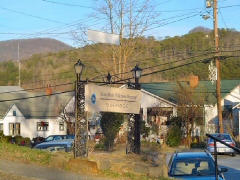| From Strugglingteens.com Visit Reports Clayton, Georgia
The first group was an all girls group, one of which was my newly referred student. She had been at Second Nature approximately two weeks at the time of my visit. Lisa Schiess, LPC, one of the two field therapists, introduced us and I saw that she looked about how I felt when I was in the wilderness several years ago. She looked natural and healthy with some newly found clarity. She maintained good eye contact and held herself with a sense of pride, yet it was obvious to me that she still had a long way to go. After I talked with Lisa and my client for a bit, we settled down in a circle with the group for a very impressive staff rotation. Second Nature rotates staff in a way that I'd never seen before, but I liked the concept. They call it Mullan, and the outgoing staff, and incoming staff and students sit in a circle to communicate all the information the incoming staff will need to continue the students' progress and safety. The thing that makes Second Nature's rotation unique from other programs I've visited is that the staff talks about the students while the students are right there. There aren't private meetings about students' progress or concerns, but rather an open meeting with open communication. The Mullan group opens with a ritual stick breaking, and students are asked to listen to the information the staff shares. The field staff shares each student's medical status, progress, and upcoming concerns. While staff members review their notes and discuss the students, they incorporate positives about each student to give encouragement. At the time of my visit, Second Nature had four groups in the field. Each group was strategically placed close together, but with enough space between them that they wouldn't "run into" each other. Second Nature groups typically average nine students each. Second Nature uses phases to assist a student with progress. The first day or two begins with the Earth Phase. Students receive a packet that explains the phase and what is expected of them to complete the phase. The student is separated from the group and asked to observe its dynamics while learning "patience, silence and stillness," and "choosing to comply" with the program. When the student has fulfilled the Earth Phase requirements, they must ask to join the group. In the second phase, the Fire Phase, the student works on "accountability and engagement." Students begin to take accountability for their behaviors, and staff work to engage students in their individual processes. This phase includes an extensive list of assignments, including sharing impact letters, actively participating in groups and a solo. My student was preparing to transition into the Water Phase at the time of my visit. Lisa explained to me my student did well on her first solo and had gained insight into some of her issues. In the Water Phase, students begin to mentor newer students, invest in their own progress and wellbeing and in the wellbeing of others. A second solo experience allows leadership responsibilities to emerge as the student becomes aware of emotional issues. In the fourth and final stage, the Air Phase, students focus mostly on leadership and the future. They lead the group for an entire day, in hikes, groups and lessons. The student also prepares a plan for future interventions and continued awareness of issues. After the Mullan session, Dan and I hiked back to the rig and drove to another group. This was a larger group of boys, some newer, some older. As we walked up to the group, they were just breaking up from their Mullan session. We circled back up and began an introduction group. One young man had just been confronted by an honesty letter from home and was trying to digest the information his parents had shared. He was angry and manipulative, and after the introduction group broke, called a standing group to talk about his newly found issues. Despite the evidence shared with the group, he cried and raged that everyone else was lying. The culture of the peer group was impressive as each student shared their mistrust with him and confronted his lying and drama issues. I was impressed with the compassion and insight shown by the staff as they proceeded with the impromptu group. Jeff Scott, MS, LPC, the other of the two therapists in Georgia, called him on his drama and recommended that he take a closer look into himself and his behaviors. We left the second group and drove the loop leading back down to the headquarters where the newly relieved staff members were debriefing and journaling notes into student files. I felt a sense of organization and unity as I watched the finale of the staff rotation process. I was impressed with what I'd seen both in the field and at headquarters with the staff, as well as how the students had interacted not only with each other, but also the staff, and with me as a visiting professional. © Copyright 2012 by Woodbury Reports, Inc. |
